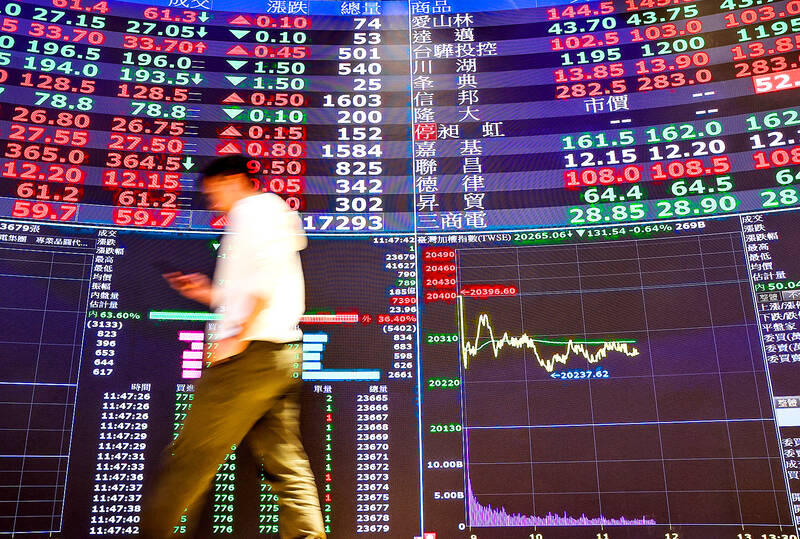US investors would be prohibited from trading TAIEX futures by the US securities regulator from as early as July 29 due to a classification of the TAIEX as a so-called “narrow-based security index,” the Financial Supervisory Commission (FSC) said on Tuesday.
The heavy weighting of contract chipmaker Taiwan Semiconductor Manufacturing Co (TSMC, 台積電) has prompted the TAIEX futures to hit criteria set by the US Commodity Futures Trading Commission (CFTC).
Therefore the CFTC is expected to ban US investors from trading TAIEX futures and mini-TAIEX futures.

Photo: CNA
TAIEX futures and mini-TAIEX futures have different contract terms, including value and deposits, but their underlying index is the TAIEX.
From Feb. 15 to Monday, TSMC, the most heavily weighted stock in the local market, had accounted for more than 30 percent of the local main board’s total turnover for 45 trading sessions in a row, which led the TAIEX to meet one of the criteria set by the CFTC defining it as a narrow-based security index.
Due to TSMC’s heavy weighting, the CFTC would soon be informed by the Taiwan Futures Exchange that the exchange has met the criteria to be classified as a narrow-based security index, Securities and Futures Bureau Deputy Director-General Julian Hwang (黃厚銘) said on Tuesday, adding that the exchange awaits a response from the CTFC regarding revoking trading permissions of TAIEX futures and mini-TAIEX futures, he said.
The CFTC’s revoking of the trading permission for TAIEX futures and mini-TAIEX futures would likely be implemented on July 29 because of a three-month grace period, Huang said.
US investors make up only 0.7 percent of the transactions in Taiwan’s futures markets, Huang said.
Many investors in the US markets belong to multinational groups, which allow them to trade TAIEX futures through overseas affiliates, he said.
The impact of the revoking on the local equity market is expected to be minimal, he added.
However, past experiences indicate the impact could be more serious.
In April 2021, the CFTC revoked TAIEX futures and mini-TAIEX futures trading permissions, also because TSMC’s heavy weighting led the TAIEX to be classified as a narrow-based security index.
The trading permissions were not regranted until October 2022. During the period, the TAIEX fell from 16,571 to 12,856.
It is unlikely that the FSC would impose a weighting ceiling on a single stock to avoid a CFTC ban, Huang said.
However, Taiwan Futures Exchange officials would make more visits to foreign institutional investors to encourage them to participate in the local futures markets, he said.

When Lika Megreladze was a child, life in her native western Georgian region of Guria revolved around tea. Her mother worked for decades as a scientist at the Soviet Union’s Institute of Tea and Subtropical Crops in the village of Anaseuli, Georgia, perfecting cultivation methods for a Georgian tea industry that supplied the bulk of the vast communist state’s brews. “When I was a child, this was only my mum’s workplace. Only later I realized that it was something big,” she said. Now, the institute lies abandoned. Yellowed papers are strewn around its decaying corridors, and a statue of Soviet founder Vladimir Lenin

UNCERTAINTIES: Exports surged 34.1% and private investment grew 7.03% to outpace expectations in the first half, although US tariffs could stall momentum The Chung-Hua Institution for Economic Research (CIER, 中華經濟研究院) yesterday raised its GDP growth forecast to 3.05 percent this year on a robust first-half performance, but warned that US tariff threats and external uncertainty could stall momentum in the second half of the year. “The first half proved exceptionally strong, allowing room for optimism,” CIER president Lien Hsien-ming (連賢明) said. “But the growth momentum may slow moving forward due to US tariffs.” The tariff threat poses definite downside risks, although the scale of the impact remains unclear given the unpredictability of US President Donald Trump’s policies, Lien said. Despite the headwinds, Taiwan is likely

UNIFYING OPPOSITION: Numerous companies have registered complaints over the potential levies, bringing together rival automakers in voicing their reservations US President Donald Trump is readying plans for industry-specific tariffs to kick in alongside his country-by-country duties in two weeks, ramping up his push to reshape the US’ standing in the global trading system by penalizing purchases from abroad. Administration officials could release details of Trump’s planned 50 percent duty on copper in the days before they are set to take effect on Friday next week, a person familiar with the matter said. That is the same date Trump’s “reciprocal” levies on products from more than 100 nations are slated to begin. Trump on Tuesday said that he is likely to impose tariffs

HELPING HAND: Approving the sale of H20s could give China the edge it needs to capture market share and become the global standard, a US representative said The US President Donald Trump administration’s decision allowing Nvidia Corp to resume shipments of its H20 artificial intelligence (AI) chips to China risks bolstering Beijing’s military capabilities and expanding its capacity to compete with the US, the head of the US House Select Committee on Strategic Competition Between the United States and the Chinese Communist Party said. “The H20, which is a cost-effective and powerful AI inference chip, far surpasses China’s indigenous capability and would therefore provide a substantial increase to China’s AI development,” committee chairman John Moolenaar, a Michigan Republican, said on Friday in a letter to US Secretary of